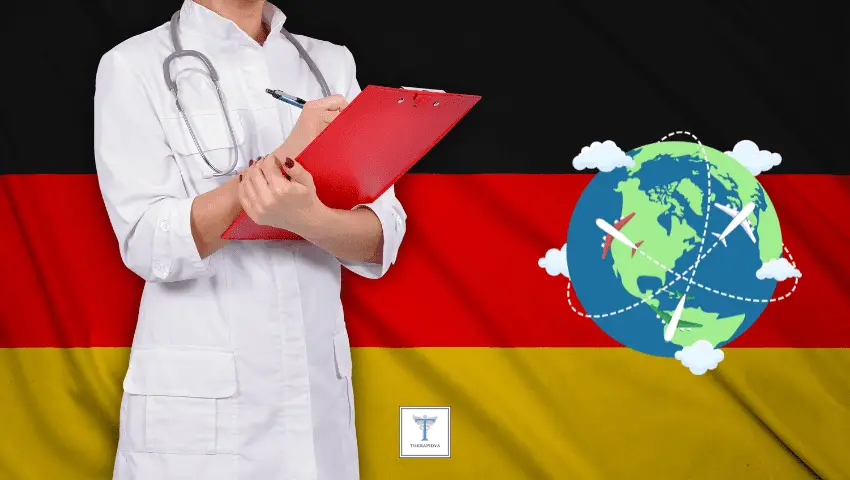How to Work as a Foreign Doctor in Germany .. 2023
Working as a foreign doctor in Germany is a lot of doctors dream because of Germany’s quality living conditions and high salaries. Germany has also opened its doors to doctors from abroad in accordance with certain conditions.
Is it possible to work as a foreign doctor in Germany? What are the necessary conditions for this? Do you need a visa to work? The answer to all these questions can be found in our article.

Health System Status of Germany
In terms of other countries, Germany has a very good healthcare system. In order to get the best care, cutting-edge therapies and medical equipment are used Patients get the medical care they need as quickly as possible thanks to a dense network of clinics and doctors who live there. The digitalization of healthcare is opening up new ways for people to get medical help. Data can be quickly available through an electronic patient record, or this method can be used to get to digital health apps and telemedicine.
As a result, Germany’s healthcare sector has a lot of power to come up with new ideas and a strong economy. Healthcare, which has more than 5.8 million employees, is also a big source of doctor jobs in Germany. The number of employees has been rising steadily for a long time. There are over 536,000 doctors who work. They make sure that patients are well taken care of.
Also read: Doctor salary in Germany
Your Career as a Foreign Doctor in Germany
In Germany, there is a shortage of young medical professionals. Demand will keep rising over the next few years, especially because many doctors in the hospital field are going to retire and leave their jobs. In the field of resident doctors, general practitioners and family doctors are the most sought after. As a result, many doctors can no longer pass on their work. This is especially true in eastern Germany and rural areas.
It has also been a big rise in the number of foreign doctors who work in Germany. In 2020 alone, 8,826 doctors from outside the United States applied to see if their foreign qualifications were the same as those in the United States, which is why they did this. This put doctors in second place in the list of the most difficult jobs, behind health and nurses.
If you are a medical professional in Germany, you can look forward to a wide range of jobs. As an example, you could work in a hospital or clinic, a health center for the elderly, or a nursing home. As a worker or employee, you are usually found in this part of the world However, you can also run a medical facility on your own as a resident doctor or a resident doctor and run it on your own.
Medical research and teaching are just two of the many jobs that can be done. You can also work for health authorities, health insurance companies or in the private sector, for example as a scientist in the medical technology or pharmaceutical industries. Overall, doctors in Germany make the most money of all academic fields, and they make the most money in Germany.

Admission Requirements for Doctors from Abroad
In Germany, if you did your medical training outside of Germany, you will need state approval, or approval, to be able to do your work and medical doctor jobs in Germany. You won’t be able to work as a doctor in Germany unless you get this permission from the government. An unrestricted professional permit is the state’s permission to work in a certain field of work. In order to get this, it must be proven that your medical training is the same as that in Germany, so that you can get it.
The licensing authorities in each of the federal states are the ones who can help you get a physician jobs in germany. A list of the people who give permission can be found here. Proof that you are healthy, that you are a good person, and that you already know some German are usually required when you apply for approval and a professional permit. You can find out what language skills are needed in each of the 50 states by going to this page.
A foreign doctor who wants to work in Germany must have the following practical competencies:
- Practical year (PJ) of 48 weeks
- First aid training
- Nursing service of three months
- clinical elective of four months (two months of internship in hospital, one month in a doctor’s office or outpatient facility, one month in a GP practice)
These practical phases of the training are completed at different times. The PJ completes the studies. After its completion, the last “approval test” takes place.
Have you been able to get more medical training or specialize as a specialist doctor in another country? That’s when you can apply to have this technical name become official. Only if you already have a medical license do have a chance to do this job.
See “Recognition in Germany” or call the German Medical Association for more information about the process of becoming a doctor in Germany.

Do I Need a Visa to Work as a Foreign Doctor in Germany?
As a citizen of the European Union, Liechtenstein, Iceland, Norway, or Switzerland, you don’t need a visa or a permit to stay in the country you’re going to visit. People from other countries who want to work in Germany need a visa. Find out more about visas in the visa section. You can learn more about visas for professionals and the EU Blue Card there, as well.
When applying for recognition of your professional credentials, think about whether or not the German government has found that you don’t have enough skills to get full recognition. Then, find out if you can get a visa to have your foreign professional qualifications. This is what you should do.
How many foreign physicians are working in Germany?
56,107 foreign physicians are working in Germany. (2020)
How many foreign doctors working in Germany are from countries other than the EU?
More than 32,000 foreign doctors working in Germany are from countries other than the EU.
This post is also available in: العربية (Arabic) Dansk (Danish) Nederlands (Dutch) Français (French) עברית (Hebrew) Italiano (Italian) Polski (Polish) Română (Romanian) Русский (Russian) Türkçe (Turkish) Español (Spanish) Български (Bulgarian)






